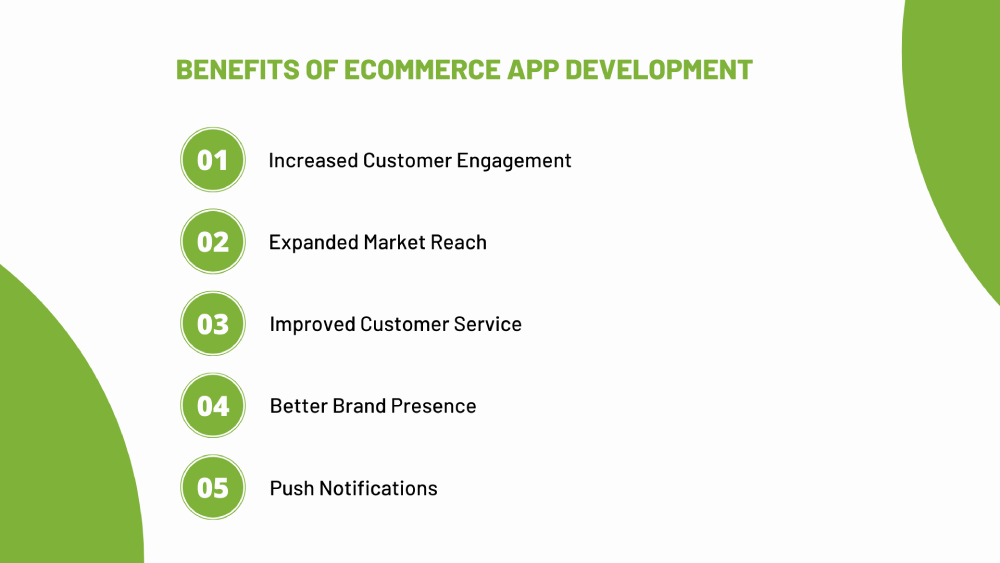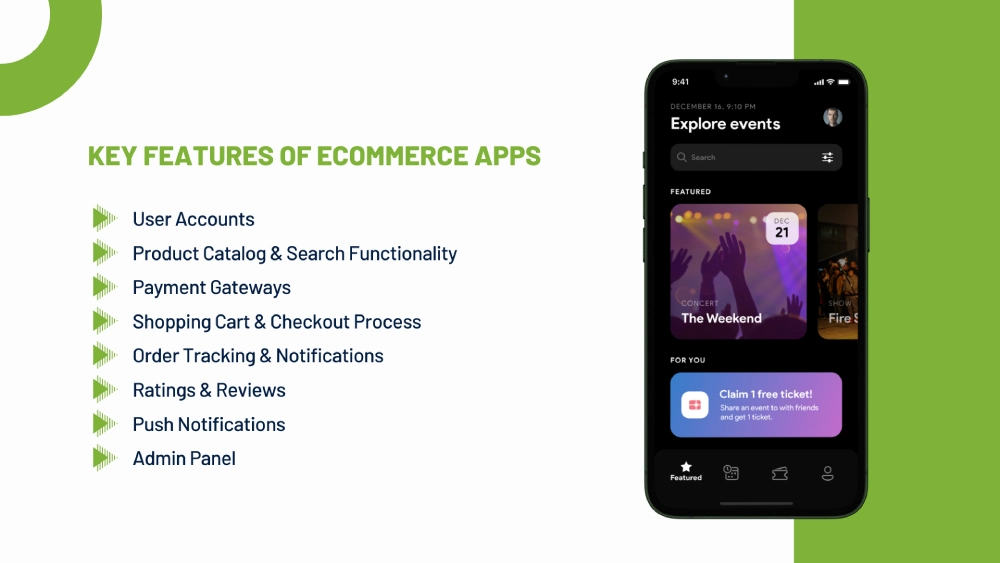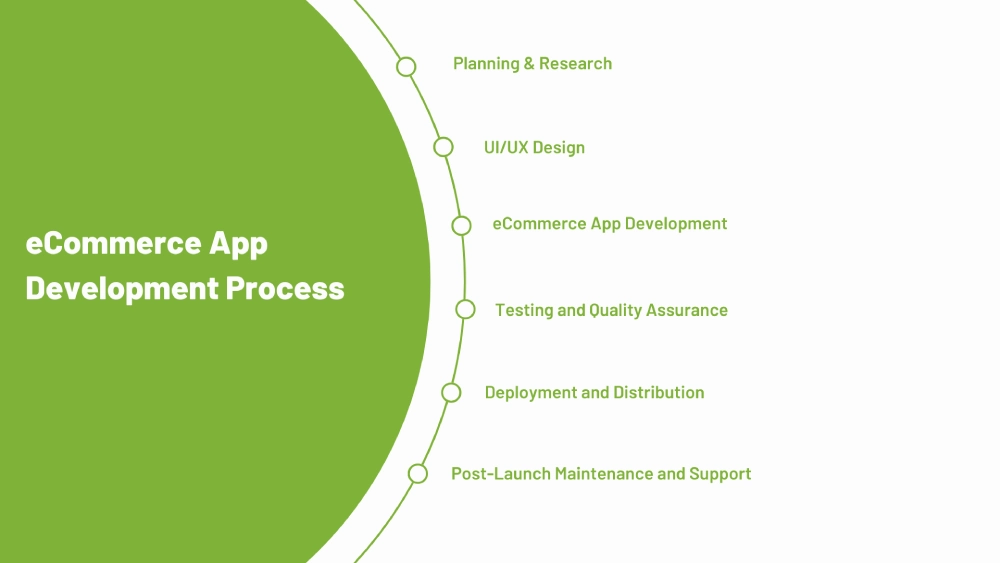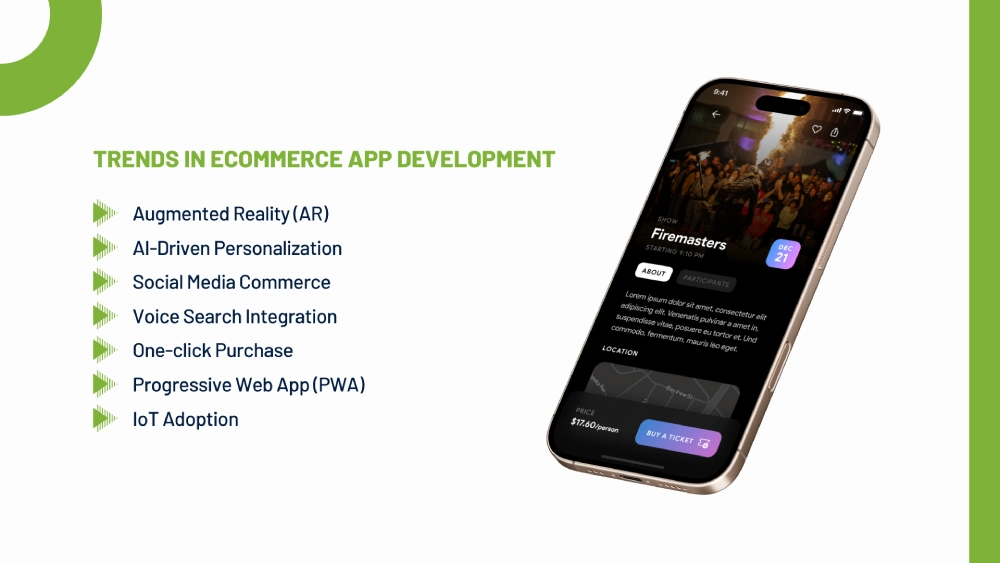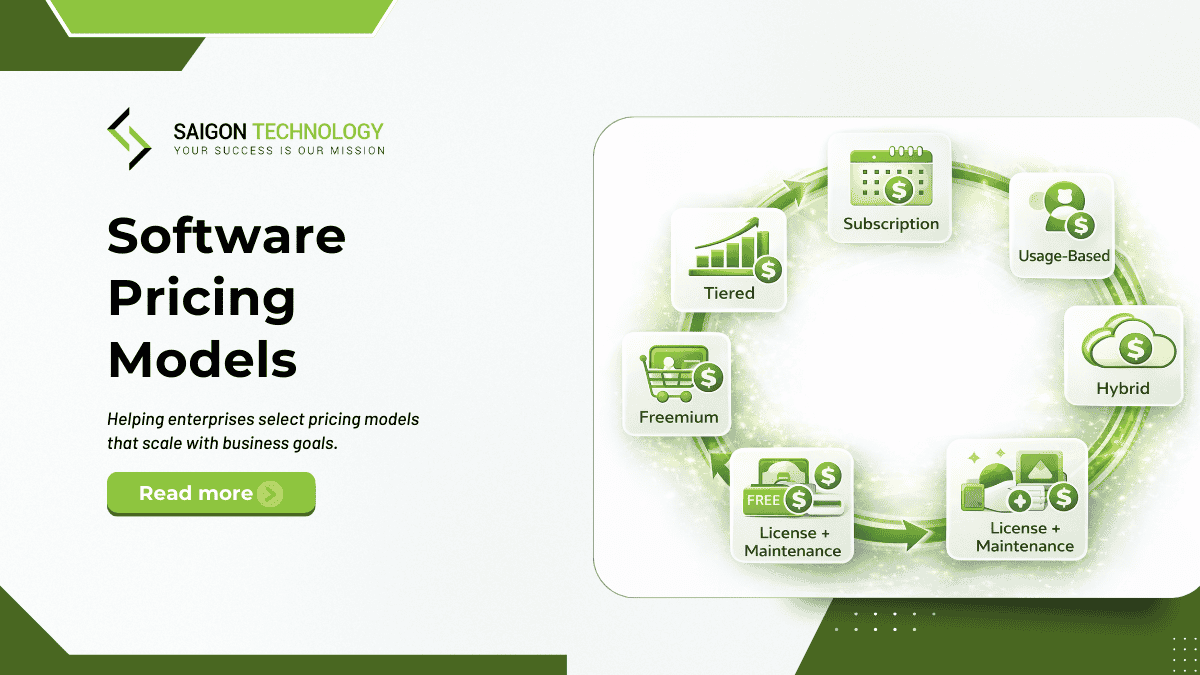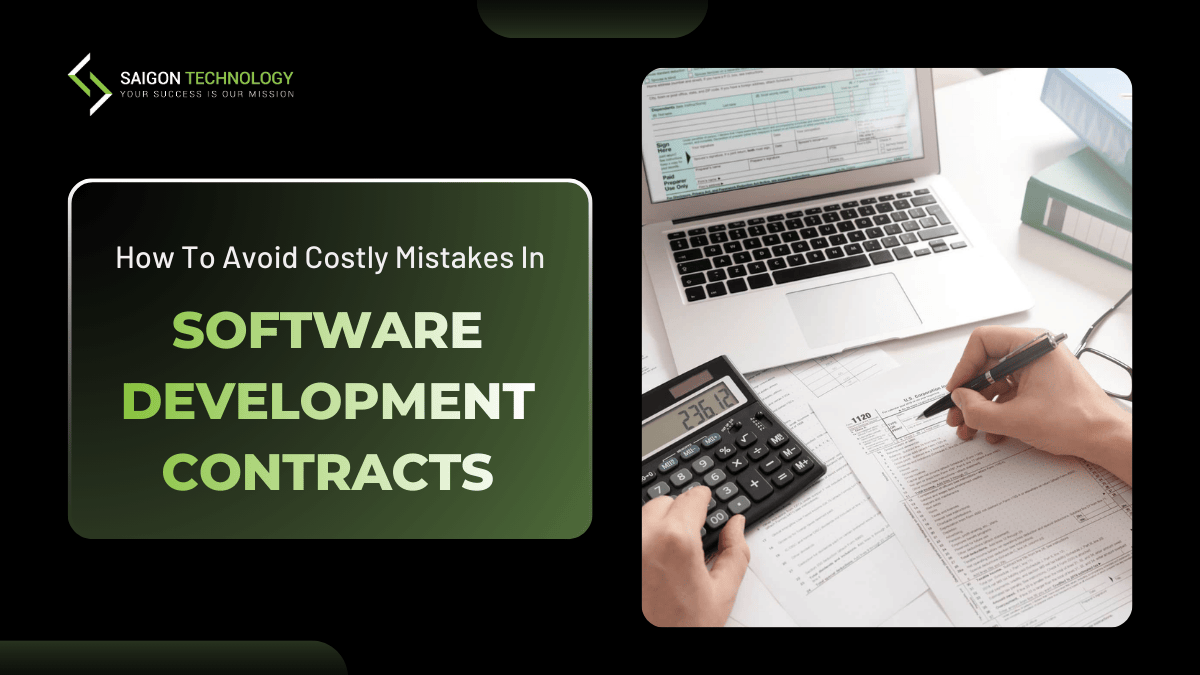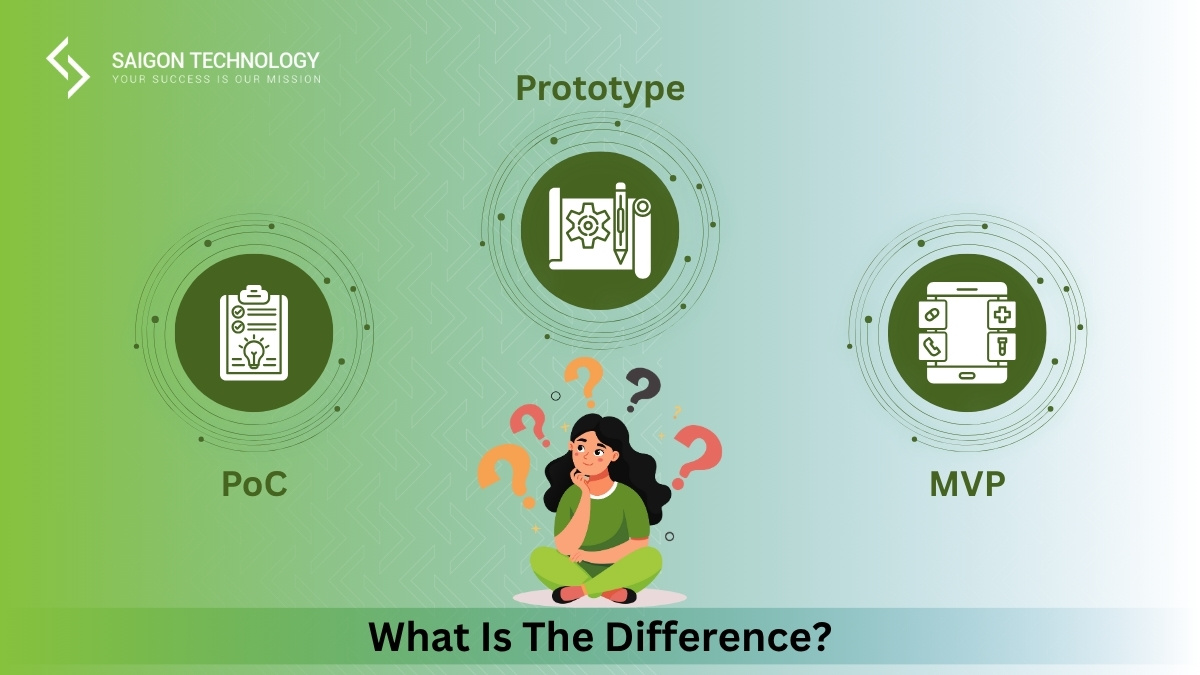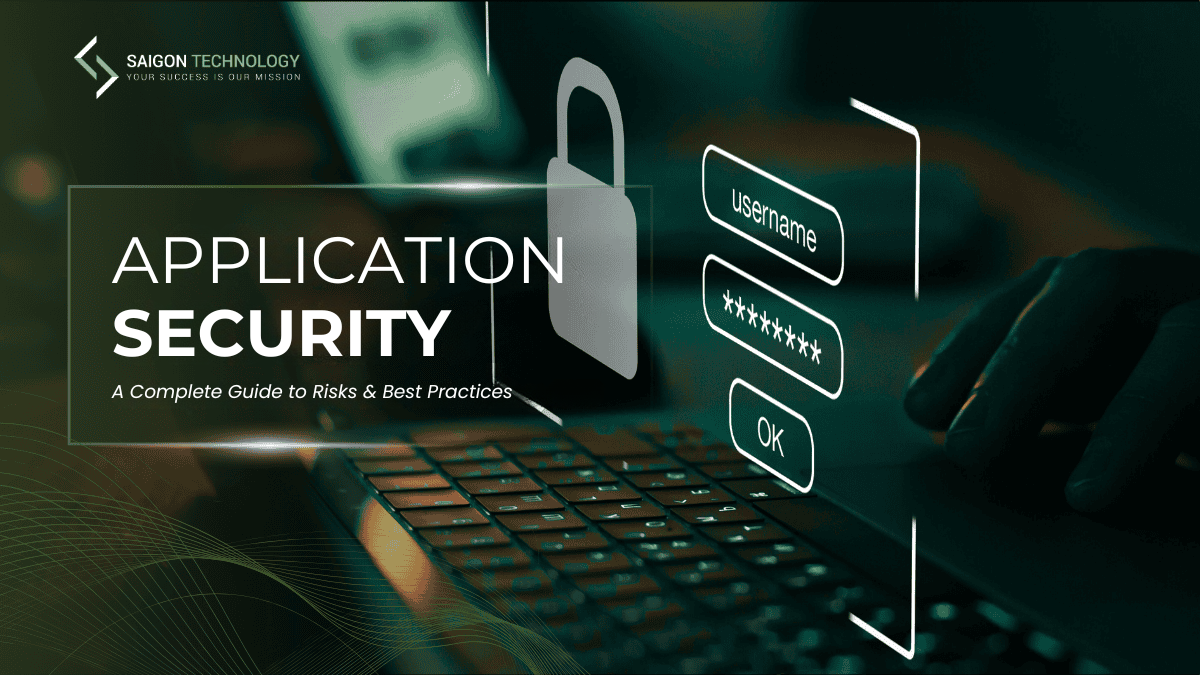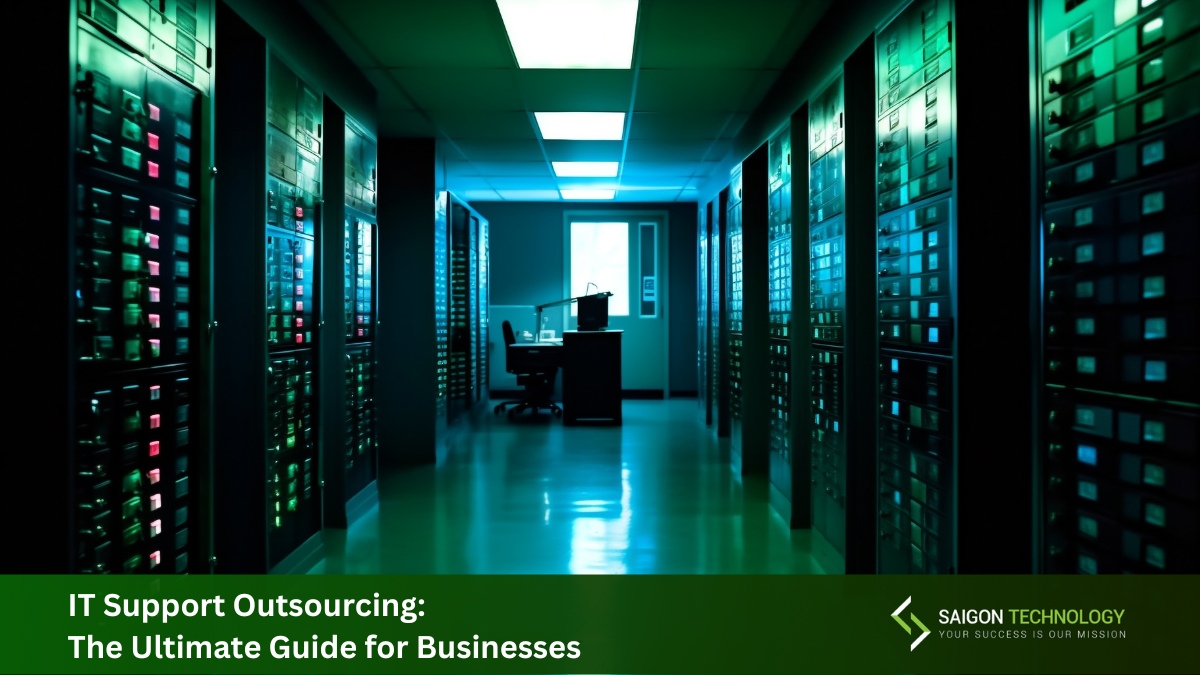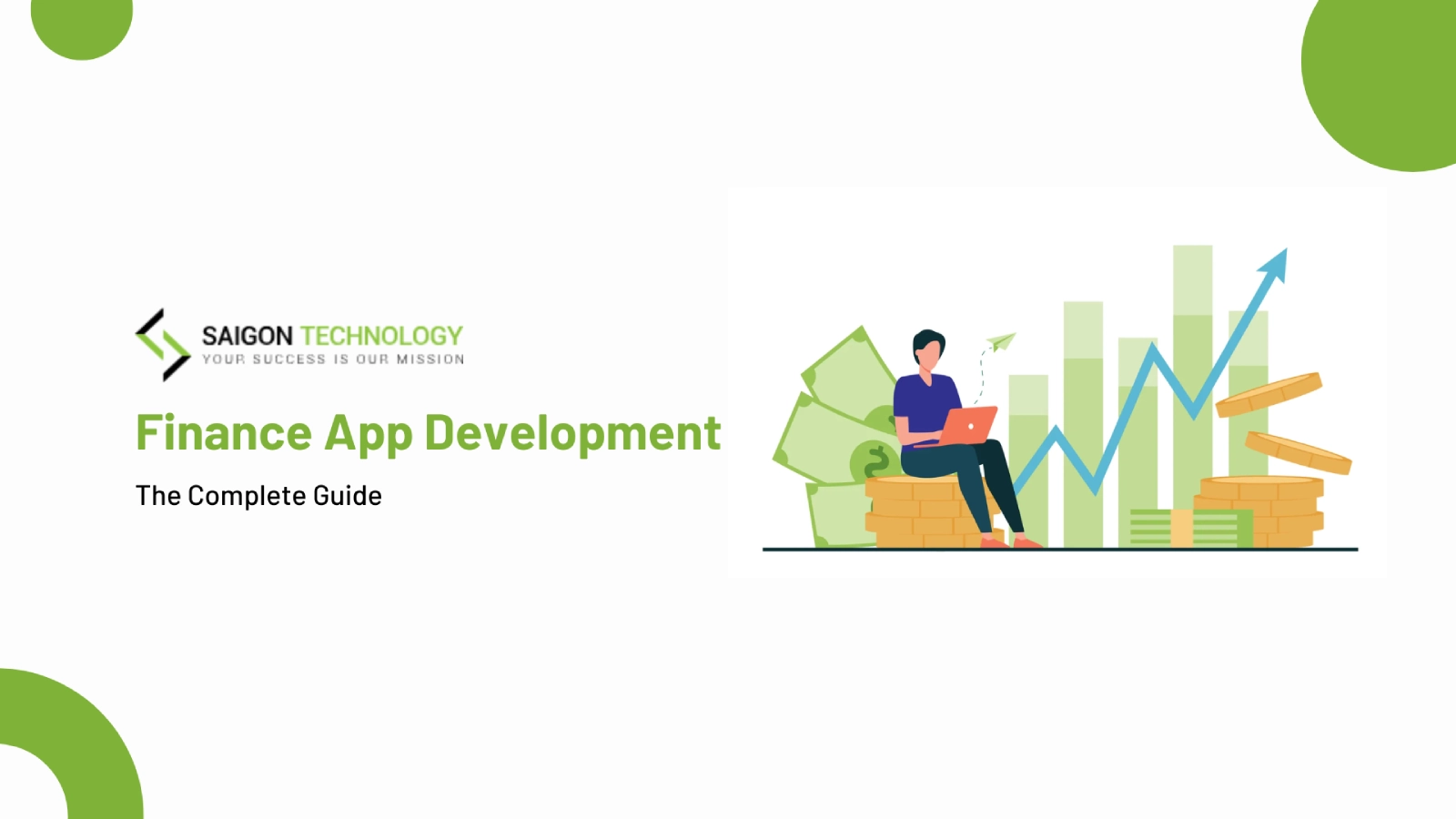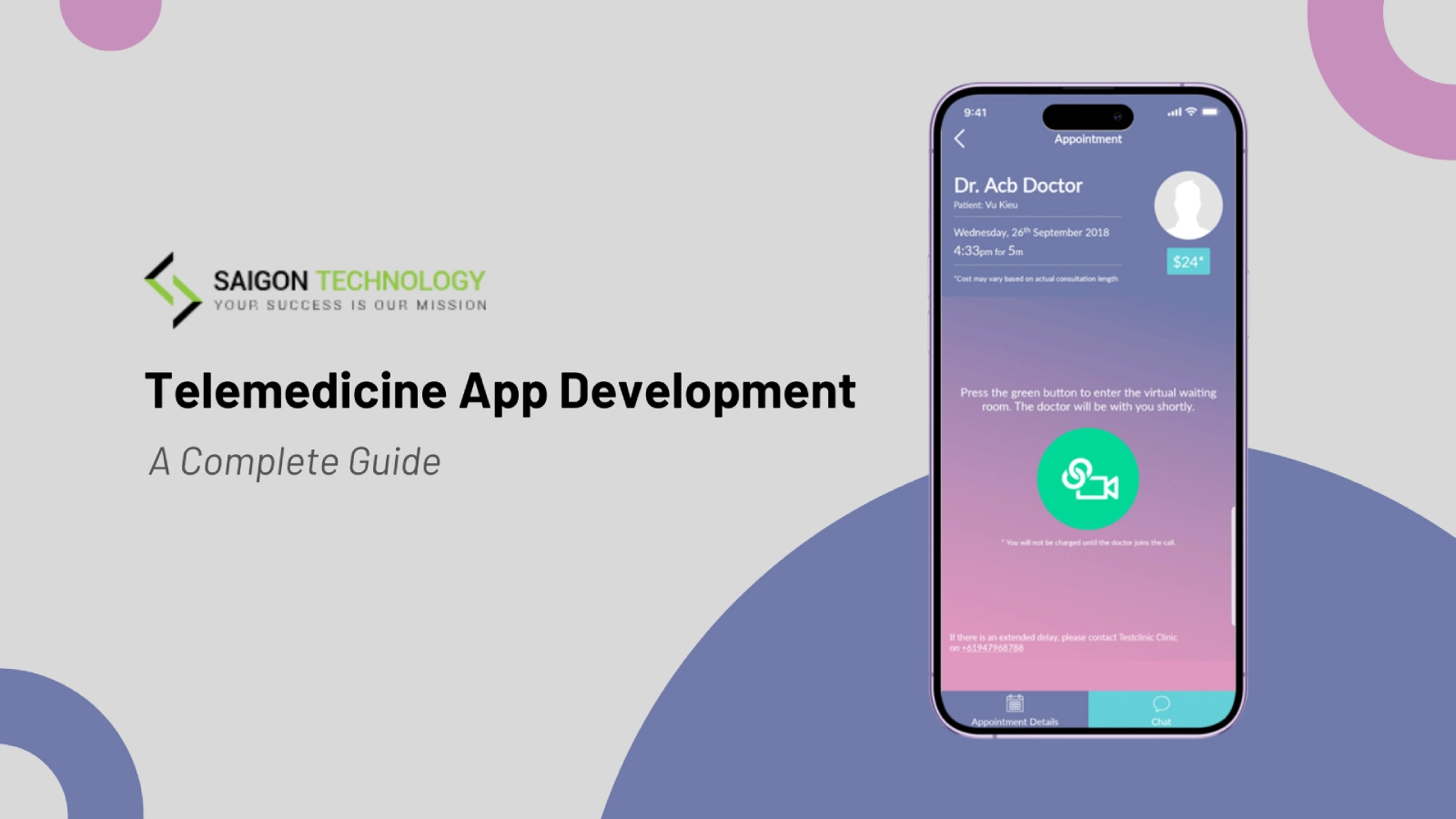eCommerce app development is reshaping the eCommerce market. eCommerce apps help businesses connect with their customers and drive sales. In fact, mobile ecommerce sales projections indicate that sales are expected to hit $2.07 trillion in 2024. This figure may reach $3.35 trillion by 2028. That’s huge!
Moreover, according to Statista, in May 2020, 62% of surveyed U.S. adults reported shopping in stores, while 52% shopped online more, reflecting the COVID-19 impact on shopping habits and user behavior changes. Since people are increasingly using mobile phones, mobile app development has become essential to winning their hearts with a powerful eCommerce app.
If you are thinking about developing an eCommerce app, start now! This article dives into the benefits of building an eCommerce app. You can also explore eCommerce trends, essential features, and the cost of mobile commerce app development. Keep reading to learn the ins and outs of eCommerce app development!
What is an eCommerce App?
An eCommerce mobile app is a smartphone or tablet app designed for buying and selling products or services online. It all started in 1979 when Michael Aldrich invented online shopping. These apps are now changing the eCommerce market. Customers shop more easily, and businesses can effortlessly sell their products, manage inventory, and track orders. All these amazing things happen from a smartphone.
Now, you can see many popular online marketplaces. The biggest names in eCommerce mobile app development are:
- Amazon, eBay, Etsy (B2C)
- Alibaba (B2B)
- Poshmark, Depop (C2C)
eCommerce App Examples
Here are some standout examples of eCommerce apps. Each reflects the possibilities of eCommerce mobile app development.
INSTACOUPON
This eCommerce application development project highlights personalized shopping experiences. INSTACOUPON is a m-commerce app that keeps users updated with discount coupons. They can save while they shop. The eCommerce app developer also ensures smooth transaction processes via bank accounts. Some key features are:
- Location-based deals triggered by beacons.
- Exclusive offers from bars, shops, and restaurants.
- Tailored notifications based on user needs.
- Reliable banking integration for secure payments.
EVNT Mobile
EVNT Mobile is an innovative eCommerce mobile app designed for iOS and Android. It aims to cater to nightlife and events across many countries. Key features include:
- Real-time deals triggered by beacon technology.
- Personalized offers from restaurants, bars, and shops.
- Ad support via AdMob or private agencies.
- Notifications tailored to user preferences.
Ready to create standout custom eCommerce solutions tailored to your needs? Contact us today and let’s bring your vision to life! Contact us!
Benefits of eCommerce App Development
Back in 2021, there were nearly 15 billion mobile devices worldwide. This number may reach 18.22 billion by 2025. The significant increase in mobile usage highlights how important it is to have a mobile-friendly platform to engage customers. If you plan to develop an eCommerce app, you will surely gain tons of benefits, such as:
Increased Customer Engagement
When you build a mobile commerce app, you can personalize shopping experiences that make customers feel special. Features like loyalty programs and real-time notifications keep them engaged and encourage them to return. Your app becomes a go-to destination for shoppers!
Expanded Market Reach
More people use mobile devices to shop. Thus, as you build an eCommerce app, you unlock access to global markets. eCommerce apps cater to mobile-first users. You can use them to connect with your customers anywhere, anytime. This way, you can reach a broader audience and increase sales.
Improved Customer Service
When you create an eCommerce app for smartphones, you provide instant customer support. You can add features like live chat, order tracking, and personalized recommendations. Customers then can shop and resolve issues easier.
Better Brand Presence
Mobile apps keep your brand right on customers’ devices. This constant visibility boosts recognition and opens doors for direct marketing. Your app now acts as a daily reminder of your awesome products and services. So get ready to develop an eCommerce app to grow your brand!
Push Notifications
Push notifications let you instantly share sales, offers, and product updates with your customers. With this simple tool, you can spark interest and drive more conversions. It also boosts customer retention.
Types of eCommerce Applications
Businesses have different needs for their eCommerce strategies. Thus, there are several types of eCommerce applications to choose from.
B2C (Business-to-Consumer)
B2C eCommerce apps connect businesses directly with customers. You can showcase your products and deals seamlessly. Shopping then becomes faster and easier. Big names like Amazon, Walmart, Zara, and H&M thrive on these platforms.
B2B (Business-to-Business)
B2B eCommerce apps allow companies to sell products or services to other companies. The apps focus on bulk orders, wholesale pricing, and streamlined transactions. They connect suppliers with buyers to simplify procurement. Apps like Alibaba and ThomasNet are prime examples.
C2C (Consumer-to-Consumer)
eCommerce mobile app development can connect consumers. C2C eCommerce apps help people buy and sell directly with one another. These apps are popular for second-hand items or peer-to-peer transactions. Think eBay, Poshmark, and Craigslist as examples. These apps create a secure, easy space for users to trade goods effortlessly.
C2B (Consumer-to-Business)
C2B eCommerce apps let individuals sell their products or services to businesses. We have platforms like Upwork or Fiverr, where freelancers offer skills to companies. In this case, C2B apps help individuals showcase their expertise and assist businesses in finding talent.
Key Features of eCommerce Apps
eCommerce mobile app development features are what make the shopping experience seamless and exciting. Check this section to explore essential features that can drive business growth!
User Accounts
App development for eCommerce provides secure registration, login, and profile management. Customers can then easily track their orders and save wishlists. User accounts also allow shoppers to view purchase history. These features aim to offer a personalized experience.
Product Catalog & Search Functionality
With clear product displays and handy filters, customers can quickly find exactly what they are looking for. Search tools help refine results. This way, customers can browse through categories and compare products. If you want to showcase your excellent products without overwhelming your customers, stick to these features!
Payment Gateways
You can integrate eCommerce mobile apps with popular payment methods like credit/debit cards and PayPal. Mobile wallets like Apple Pay and Google Pay also help customers complete their purchases easily. When you build an eCommerce mobile app, these payment gateways ensure a smooth and safe payment experience.
Shopping Cart & Checkout Process
A simple, easy-to-navigate cart lets customers review their selections before checkout. Multiple payment options, like mobile wallets and credit cards, provide flexibility. With online shopping app development, this feature ensures a hassle-free checkout. You can use it to improve customer satisfaction.
Order Tracking & Notifications
Another key feature used in eCommerce mobile application development is order tracking and notifications. Customers can easily track their orders. They also receive updates on shipping, delivery, and any changes. Meanwhile, real-time notifications ensure customers know every step of the shopping and delivery journey.
Ratings & Reviews
eCommerce mobile apps allow customers to leave feedback and rate products. In this manner, they help others make informed decisions. With this feature, you can understand customer preferences and improve your products. It’s a simple way to build trust and inform future customers!
Push Notifications
Push notifications deliver personalized offers, reminders, and updates directly to users. For example, if you want to offer your customers a special discount, your mobile app should inform them. This feature helps you stay connected with your audience and boost sales.
Admin Panel
The admin is in charge of monitoring and managing the whole shopping process. To make their job easier, you can add an efficient admin panel side. The panel helps the admin handle client, order, and store management tasks easier. Even complex features like rewards, promotions, and filtering systems would become easier.
Challenges in eCommerce App Development
eCommerce app development, despite the outstanding benefits, has its own set of challenges. You have something to do during the app development process to ensure everything is fine!
Security Concerns
Security must be your top priority when developing an eCommerce app. Remember to protect payment details and user data. Prevent fraud, too, or both you and your customers will be the victims. To secure the app, you can use private clouds and encrypt stored data. Also, conduct regular security audits once your app is live to ensure it’s in good condition.
API Integration
API integration can be tricky in eCommerce mobile app development. The integrations must work smoothly so your app can function as expected. You need to connect your app with third-party services like payment gateways, shipping carriers, and inventory management tools. All these tasks require careful planning.
Consistency with Marketing Strategies
Another challenge in mobile app development for eCommerce is how you handle marketing. The app must align with online campaigns, promotions, and branding. Moreover, make sure that your app reflects your business goals while delivering a seamless user experience.
Scalability
As your business grows, the app must handle more traffic, products, and customer data. If your app is not scalable, performance issues may arise at any time. So bear this in mind when you create an online shopping app. Remember to plan for growth from the start so the app stays reliable as your business expands.
Cross-Platform Compatibility
Your customers may use different devices, like iOS, Android, and tablets. Some even access it via browsers. Thus, when you create an eCommerce mobile app, make sure it can work smoothly across various platforms. That’s the goal, but cross-platform compatibility can be tricky.
Choosing the Right Tech Stack for Ecommerce App Development
How to develop an eCommerce app successfully? Technology plays a key role here. Ensure your eCommerce app developer makes the right decision. Here are our recommendations!
Frontend Development
Frontend development in mobile app development for ecommerce is about creating the part users interact with. Some of the best tools are:
- React Native and Flutter: These cross-platform app development frameworks allow you to write one codebase that works on iOS and Android.
- Swift: If you are focusing on native iOS apps, Swift is the ideal language for speed, security, and performance.
- Kotlin/Java: Kotlin and Java are the go-to languages for native eCommerce Android app development.
Read more: Native App Development: Everything You Need to Know
Backend Development
Backend development focuses on the server-side of the application. You need the right technology to handle databases, user authentication, and app logic.
- Node.js: This popular backend framework is known for its fast model, making it ideal for dealing with multiple requests.
- Ruby on Rails: The ease of use and quick development make Ruby on Rails perfect for startups.
- Django: This framework offers security features and scalability. You can develop your eCommerce app with less time and less effort.
Database Management
Databases store all critical data, like orders, customer information, and product details. You will find these tools helpful:
- MySQL: The open-source availability is a big plus. You can also take advantage of MySQL’s high security and efficiency.
- PostgreSQL: This system offers many incredible features in terms of security and performance.
- MongoDB: You can use this NoSQL databases management system to handle large data. NoSQL databases are generally easier and cheaper to maintain.
Payment Integration
Payment solutions allow you to manage transactions in your app securely. The most popular choices are:
- Stripe: This payment solution offers easy integration and multiple payment methods.
- PayPal: Widely used by millions of people, this app ensures smooth transactions for users.
Cloud Infrastructure
Cloud services help you host your eCommerce app. Some solutions you should try are:
- AWS (Amazon Web Services): Cloud services from AWS are highly scalable and flexible.
- Google Cloud: Google Cloud is known for its data analytics and AI tools.
- Microsoft Azure: The strong focus on security and compliance makes Microsoft Azure ideal for eCommerce app development.
Third-party Integrations
You may want to perform some tasks related to logistics, CRM, or analytics. The following integrations will help:
- ShipBob: This logistics partner offers inventory management, fulfillment, and shipping services.
- Salesforce: You can use this powerful CRM tool to track customer interactions and sales.
- Google Analytics: This tool helps you track and analyze user behaviors. Based on the analytics, you can optimize your marketing strategies.
Custom Features
Advanced features make your eCommerce app stand out. For example:
- Augmented Reality (AR): AR helps customers visualize products in real life before buying them.
- AI-Powered Recommendations: AI analyzes customer behaviors. Then, it will recommend products tailored to individual preferences.
- Advanced Inventory Management: Advanced tools can automate stock tracking to ensure your app always has up-to-date information.
eCommerce App Development Process
How to build eCommerce applications? eCommerce mobile app development is a step-by-step process that brings your app idea to life. Let’s see how it works!
Planning & Research
Your custom eCommerce app development project starts with planning and research. Think about your business goals and who your ideal customers are. Then, perform market research into user demographics and user personas. Check out what competitors are doing, too. Competitor research will show you how you can stand out. You also need to choose the right app platform, like iOS, Android, or both. Based on the research, you can map out essential features for your m-commerce application. Once the research is done, plan your project, starting with key performance indicators (KPIs) and milestones to achieve in every step.
UI/UX Design
In eCommerce mobile app development, you create a stunning yet intuitive design. A great mobile UI UX design ensures smooth navigation and grabs attention with appealing visuals. Think mobile-first because most users shop on their phones. Make it easy for them to explore!
eCommerce App Development
This eCommerce application development stage is where developers work on the front-end and back-end development. The chosen tech stack powers everything, from navigation to security. This step ensures your app functions as intended and supports powerful features. You should stick to the agile development lifecycle methodology so you can continuously improve your app and remain flexible.
Testing and Quality Assurance (QA)
Your app must be secure and free of bugs. That’s why you have QA specialists test it for speed and potential vulnerabilities to keep your customers safe. You should also assess it for performance issues. If possible, perform both automated and manual testing methods for the best result. It’s like a final checkup before the big launch. By catching issues early, you deliver a flawless shopping experience.
App Launch
The app launch is where all your eCommerce app development efforts come to life! At this stage, you publish your app on platforms like Google Play or Apple App Store. To stand out in the eCommerce app market, you need great App Store Optimization (ASO). Once live, keep an eye on its performance and reviews.
Post-Launch Maintenance and Support
Launching your app is just the beginning. After launch, you have to fix bugs, add new features, and ensure your app works well with new devices and OS versions. Regular updates keep your users happy and engaged. With consistent care, your app will continue to shine!
Cost of Developing an eCommerce App
The cost of ecommerce app development depends on various factors. Discover what they are now to plan a cost-effective solution.
Factors Affecting Ecommerce App Development Cost
When you build an eCommerce app, you must understand the factors driving costs. For example:
- Platform selection: Cross-platform solutions are cheaper because you just write a single codebase for your app to run on various platforms. On the other hand, developing native apps for iOS or Android may increase the project scope, affecting the mobile eCommerce app development costs.
- App complexity: A simple product catalog is cheaper to build. If you need advanced features equipped with Artificial Intelligence (AI) or Augmented Reality (AR), expect a higher cost. The number of third-party integration matter, too.
- Testing and quality assurance: If you want to ensure a high level of quality, pay more for testing and quality assurance jobs.
- Design complexity: Customized, user-centric UI UX designs enhance customer experience. Yet, your apps then require more resources and expenses. On the contrary, if you work on basic templates, the cost would be lower.
- Development team: In-house teams offer direct oversight but can be costly because you have to invest in recruiting, training, and managing. Meanwhile, outsourced teams may provide cost savings. If you decide to outsource, consider the geographical location of the development team. Countries like Vietnam, India, and China offer better rates than European ones.
Estimated Cost Range
Simple apps require basic functionality. You just need features like a product catalog, shopping cart, and payment gateway. The prices typically range from $10,000 to $50,000.
On the other hand, complex custom eCommerce app development involves extensive tasks. For example, you can add features like AR for product visualization or AI for recommendations and chatbot. Costs can exceed $100,000 and even reach $300,000.
Maintenance Costs
Maintenance is an ongoing task. You must ensure your app’s functionality and security. Regular updates, bug fixes, and feature enhancements may cost around 15-20% of the app’s initial development cost annually.
For example, if the initial cost is $100,000, the annual maintenance expense can range from $15,000 to $20,000. However high the cost, you need it to keep your app updated.
Outsourcing eCommerce App Development: A Strategy To Reduce Costs
If cost is your top concern, consider outsourcing to an offshore eCommerce app development company. Offshore teams provide access to skilled developers at a friendly price. The experts will help you save time and reduce overheads. Then, you can invest more time and resources in your core business activities.
Saigon Technology is a trusted eCommerce app development company. We have delivered cost-effective offshore mobile app development services to businesses of all sizes worldwide. With our expertise, you will get efficient and powerful apps tailored to your specific needs. Contact us now to get started!
Trends in eCommerce App Development
Technology keeps growing. Thus, if you want to stand out in the eCommerce industry, follow the eCommerce app development trends!
Augmented Reality (AR)
Augmented Reality (AR) is transforming eCommerce app development by making shopping more interactive and immersive. With AR, customers can virtually try on clothes or visualize how furniture fits into their homes, all within the app. This feature enhances the shopping experience, reduces return rates, and increases customer satisfaction. As virtual reality (VR) continues to grow alongside AR, the potential for creating more lifelike shopping experiences expands.
AI-Driven Personalization
AI-driven personalization is one of the most significant trends in eCommerce. Big data algorithms and machine learning are used to offer highly personalized recommendations, targeted deals, and tailored search results. Generative AI chatbots are also transforming customer service, providing 24/7 assistance and ensuring that customers receive help whenever needed. AI-powered personalization is key to creating a custom, user-centric shopping experience, which has become a must-have for modern mobile shopping applications.
Social Media Commerce
Social media commerce is taking the eCommerce experience to new heights. By integrating shopping features into platforms like Instagram, Facebook, and other social networks, users can shop directly within the app while engaging with their social feeds. This omnichannel marketing strategy helps businesses connect with consumers through multiple touchpoints, making the shopping experience seamless and socially driven. Livestream shopping is also becoming a popular trend, where brands host live events to showcase products in real time, allowing viewers to shop instantly.
Voice Search Integration
Voice-enabled shopping can really upgrade the m-commerce app experience! Voice assistants like Google Assistant and Alexa let users search and shop hands-free. Imagine saying, “Order ceramic cups,” and it’s done! With voice integration, your commerce app stands out since it offers a modern shopping experience tailored to busy users.
One-click Purchase
With this feature, shoppers can complete their orders with just one tap. The streamlined checkout process saves time and makes shopping super convenient. Businesses benefit, too, because faster checkouts mean fewer cart abandonments and higher conversion rates.
Progressive Web App (PWA)
PWAs offer fast, reliable, and app-like experiences right in your mobile browser. Users don’t need to download anything. Just click and shop! Thus, these solutions are perfect for businesses aiming to reach more users with less hassle.
IoT Adoption
The adoption of IoT (Internet of Things) is another trend impacting eCommerce. Smart devices can gather data on customer behavior and preferences, which can be used to improve product recommendations and inventory management.
Conclusion
eCommerce app development is essential for modern businesses. We have covered key features, cost factors, development processes, and some trends for your project. Each contributes to your success. Thus, embrace those principles, and your eCommerce app will stand out!
Ready to take the next step? Contact Saigon Technology for expert eCommerce app development services. We are so excited to create something big for your needs!
FAQs
How long does it take to develop an eCommerce app?
You need around 3 to 6 months to make an eCommerce app with basic features. Meanwhile, a more customized and feature-rich app can take 6 to 12 months or longer to build. The exact time for eCommerce app development depends on several factors, such as:
- Design complexity: The more intricate the design, the longer the development process.
- Platform choice: Cross-platform mobile apps require less time because you just use a single codebase for various platforms. In contrast, native apps (for iOS or Android) require separate development for each, increasing the development time.
- Integration needs: Integrating your app with third-party services like payment gateways or shipping providers can add to the timeline.
Saigon Technology follows an MVP development approach. We build the core features first to ensure the app has the minimum functionality required to meet user needs. This step helps speed up the process while allowing you to refine your apps based on feedback from early users. Contact us today to start this journey together!
What are the key features to include in an eCommerce app?
Key app features to include when you make your own eCommerce app are:
- User accounts and profile management
- Product catalog with filtering and search options
- Secure payment gateways for processing transactions
- Shopping cart and checkout functionalities
- Push notifications for promotions and order updates
- Order tracking and shipping integration
- Product reviews and ratings
- Social media sharing options
How do I market my eCommerce app once it’s developed?
To effectively market your eCommerce app, consider the following strategies:
- Competitive Market Analysis: Study your competitors to understand their strengths, weaknesses, and strategies. Identify gaps in the market and tailor your marketing efforts to stand out.
- App Store Optimization (ASO): Use the right keywords, upload eye-catching images, and write engaging descriptions to make your app easy to find.
- Paid ads: Run ads on Google, Facebook, or Instagram. Paid ads target the right people so your app reaches those most likely to install and use it.
- Influencer marketing: Team up with influencers to boost your app’s credibility and reach a bigger audience.
- First-time user promotions and discounts: Offer special deals to first-time users. This way, you can encourage them to try your app and make a purchase. They now have a reason to come back for more.
- Push notifications: Friendly reminders keep users updated on new products, sales, and app updates.
Custom eCommerce app vs. ready-made solution: Which one should I choose?
It depends on your specific requirements. For example, custom eCommerce app development ensures you have all the desired features for your app, even with AI and AR-powered ones. However, building a custom eCommerce app costs more and takes more time due to the complexity. On the other hand, ready-made solutions are quicker and more affordable to develop.



